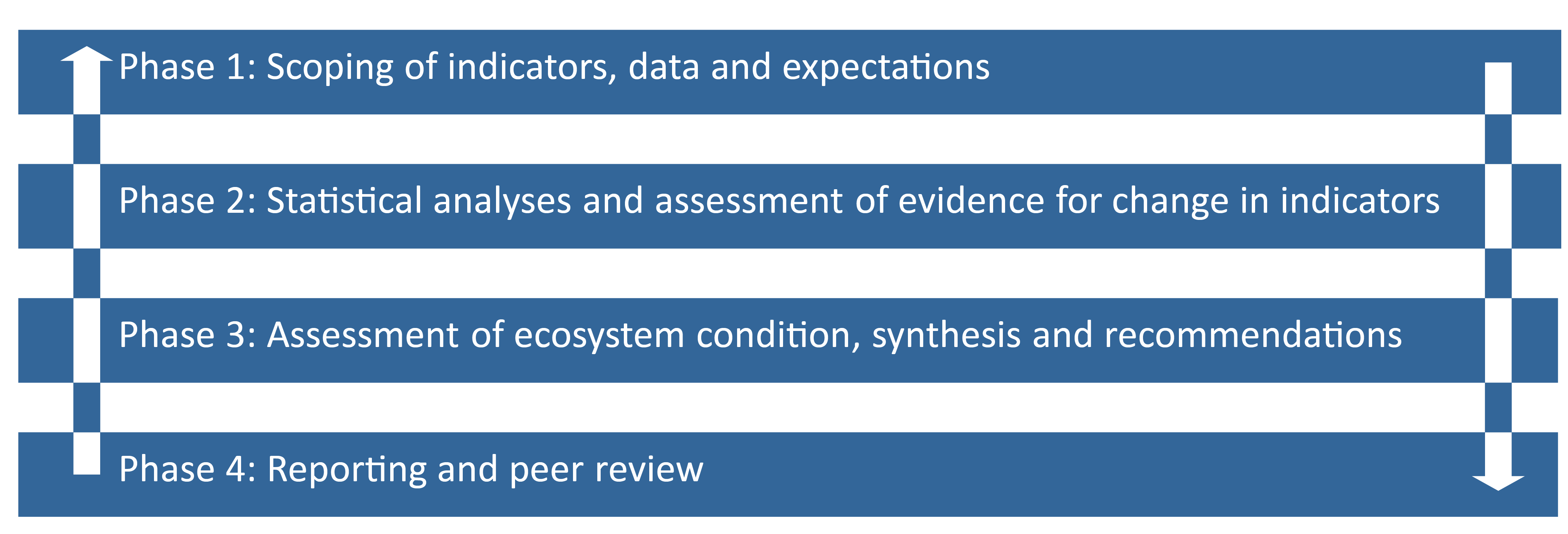System for assessment of ecological condition
The condition of Norwegian ecosystems is under scrutiny in the new national System for assessment of ecological condition. COAT is contributing both by methodological developments and by assessments of the condition of high- and low arctic tundra ecosystems.
What is System for assessment of ecological condition?
The Norwegian Environment Agency is leading the development of a new national system for assessment of the condition of Norwegian terrestrial and marine ecosystems. The assessment system is based on a set of indicators for each ecosystem, and focus on determining what can be considered a ‘good ecological condition’ of a given ecosystem, and how it can be determined whether and to which extent the condition of a given ecosystem deviate from such a reference. The system is intended to form a knowledge-based foundation for the evaluation of future management objectives for terrestrial and marine ecosystems in Norway.
The framework for System for assessment of ecological condition was described in a comprehensive report (Nybø & Evju 2017) authored by a national council of experts appointed by the Ministry of Climate and Environment in 2016. In this work, the reference condition, which should serve as the baseline for assessments of current ecosystem condition, is defined as ‘intact nature’, described as a condition in which the structure, functions and productivity of the ecosystem are not substantially influenced by human activities. The expert council further identified seven ecosystem characteristics which should be the focus of the assessment of ecosystem condition (see figure in right panel). Each ecosystem characteristics is represented by a set of biotic and abiotic indicators.
One chapter in the report from the expert council, is dedicated to tundra ecosystems (Ims et al. 2017). This chapter, which largely builds upon the science plan of COAT, describes each of the ecosystem characteristics for Norwegian low arctic (Finnmark) and high arctic (Svalbard) ecosystems respectively, some of the most central indicators for these ecosystem characteristics, and the primary anthropogenic pressures on ecosystem condition. Climate is identified as the primary defining environmental factor for ecosystem condition, and climate change hence as the overriding driver of changes in ecosystem condition.
How is COAT contributing to System for assessment of ecological condition?
Researchers from many Norwegian institutions have subsequently contributed to developing and testing methods for integrated assessments of ecosystem condition. COAT researchers have, in collaboration with marine ecologists from the Institute of Marine Research in Tromsø, been responsible for developing and testing the method Panel-based assessment of Ecosystem Condition (PAEC; Jepsen et al. 2020). PAEC is a structured protocol for assessment of the condition in an ecosystem relative to a specified reference condition. Under the System for assessment of ecological condition, this reference is defined as ‘intact nature’ (see above), but PAEC can be used relative to any defined reference condition. According to PAEC, the assessment is done by a broad scientific panel which jointly possess expertise on all the characteristics of the ecosystem (typically ecologists and climatologists). The technical protocol for PAEC (Jepsen et al. 2020), contains detailed instructions as to how the panel should progress through each of four phases in the assessment, and how the work of the panel should be documented.

The four phases in an assessment according to PAEC.
Current activities involving COAT
COAT researchers are currently leading the first operational assessment of the condition of Norwegian arctic tundra ecosystems based on PAEC. Both low arctic (Finnmark) and high arctic (Svalbard) ecosystems are included, and the final assessment report will be delivered to the Norwegian Environment Agency 1st quarter of 2021. Simultaneously, the first operational assessment of the Arctic part of the Barents sea is done, led by the Institute of Marine Research. Finally, a geographically limited, pilot test of PAEC will be performed in 2021 for four other terrestrial ecosystems (forest, alpine, wetland, and open lowland).
Read more about PAEC and System for assessment of ecological condition here:
Jane U. Jepsen, Per Arneberg, Rolf A. Ims, Anna Siwertsson, Nigel G. Yoccoz, Per Fauchald, Åshild Ø. Pedersen, Gro I. van der Meeren, Cecilie H. von Quillfeldt. Panel-based assessment of ecosystem condition as a platform for adaptive and knowledge driven management. 2024. Environmental Management, Volum 74, pages 1020-1036.
Pedersen, Å.Ø., Jepsen, J.U., Paulsen, I.M.G., Fuglei, E., Mosbacher, J.B., Ravolainen, V., Yoccoz, N.G., Øseth, E., Böhner, H., Bråthen, K.A., Ehrich, D., Henden, J-A., Isaksen, K., Jakobsson, S., Madsen, J., Soininen, E., Stien, A., Tombre, I., Tveraa, T., Tveito, O.E., Vindstad, O.P.L., Ims, R.A. 2021. Norwegian Arctic Tundra: a Panel-based Assessment of Ecosystem Condition. Report Series 153. Norwegian Polar Institute, Tromsø
Pedersen, Å.Ø., Arneberg, P., Fuglei, E., Jepsen, J.U., Mosbacher, J.B., Paulsen, I.M.G., Ravolainen, V., Yoccoz, N.G., Øseth, E., Ims, R.A. Panel-based Assessment of Ecosystem Condition (PAEC) as a Knowledge Platform for Ecosystem-based Management of Norwegian Arctic Tundra. Brief Report 056, Norwegian Polar Institute.
Jepsen, J.U., Arneberg, P., Ims, R.A., Siwertsson, A. og Yoccoz, N.G. 2020. Panel-based Assessment of Ecosystem Condition (PAEC) - Technical Protocol version 2. NINA Report 1890. Norwegian Institute for Nature Research
Jepsen, J.U., Arneberg, P., Ims, R.A., Siwertsson, A. og Yoccoz, N.G. 2019. Test av fagsystemet for økologisk tilstand. Erfaringer fra pilotprosjekter for arktisk tundra og arktisk del av Barentshavet. NINA Rapport 1674. Norsk institutt for naturforskning. (in Norwegian)
Nybø, S. & Evju, M. (Red) 2017. Fagsystem for fastsetting av god økologisk tilstand. Forslag fra et ekspertråd. Ekspertrådet for økologisk tilstand. Miljødirektoratet. (in Norwegian)